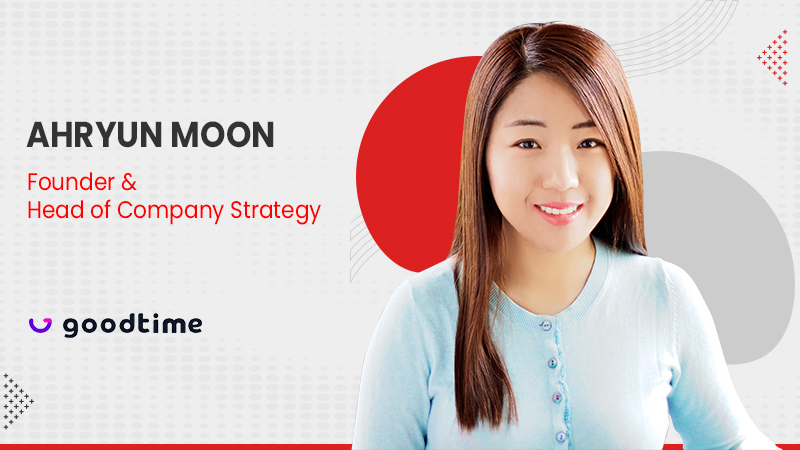“Companies are finally realizing that mindset may be even more important than skillset. You can teach skills, but you can’t really teach a mindset. “
Hi, Ahryun, could you tell us about your professional journey so far?
I worked as a financial analyst at a big semiconductor company right out of college. I thought accounting would be my career path, but then I fell in love with engineering when I first learned how to use Python, which I used to automate some of the work I was doing as a financial analyst.
Through Python, I learned the power of technology and how it could automate a lot of the mundane work that people do on a regular basis to free them up to do important strategic and creative work.
When my co-founders and I started GoodTime, we attended many hackathons together. We actually won four in a row. At the last hackathon we attended, the person presenting the award to us was a recruiter who mentioned how time consuming scheduling and rescheduling interviews were. It reminded me of my time as a financial analyst and the mundane work that I had been doing. My co-founders and I then thought, “How can we automate this for her?” That was 2016: the beginning of GoodTime and my career as an entrepreneur.
What challenges did the COVID-19 pandemic pose for you and your team?
When the nationwide lockdown mandate came into place in Q1 2020 and we were not allowed to go to the office, it caused havoc across the board. Nobody really knew how to deal with it. We had to adapt and transition to working remotely. A few people doing remote work is one thing, but having the entire company working from home while still being efficient and productive, that’s another thing.
It required a certain skill set and our team just didn’t have it back then. We had to learn it. We relied heavily on technology to input processes and minimize confusion to keep the team collaboration high. We worked through it and got pretty good at it! It certainly helped that we were also working on a solution that helps our customers stay efficient while working remotely.
Also Read: IT Digest Interview with Marcin Cichon, CEO & Co-Founder, Pricefx
What sets GoodTime apart from the competition?
There are so many scheduling solutions out in the market. Some are vertical products and others are more horizontal. What really sets GoodTime apart from them though is the “why” behind our product. Our product does much more than just schedule a meeting. We want every single meeting to be smarter, so every person walks away from that meeting thinking “Wow, this was really useful! I achieved what I came here to achieve.”
Facilitating intelligent meetings is our ultimate goal. GoodTime aims for every type of meeting – whether that be job interviews, sales meetings, or internal meetings – to be valuable to every person.
Automation is just one pillar. The second pillar is relationships. We help cultivate strong relationships between meeting attendees and that means making sure the right people are attending the right meetings and actually showing up.
The third pillar is insights and data. We provide data around meeting usage, the scheduler’s workload, and even meeting attendee behavior. These three pillars build on each other, which is what sets GoodTime apart from other meeting and scheduling solutions.
Can you give us more insights about your flagship products, Hire and Meet?
We’re all about making meetings smarter. The three pillars I mentioned before – automation, relationships, and data and insights – these apply to both Hire and Meet.
Hire is all about interviews and it starts with automation. Firstly, we automate every single interview within the whole interview process. Secondly, we make it easy for our clients to put the interviewer in every interview so the candidate has an amazing experience. We do all of that based on the data we collect.
Finally, we have data and insights. The whole interview process can seem like a black box when there is missing data. This is why we use a lot of digitalization. We put a lot of data and insights back into the interview process so VPs of talent can make the right decision.
With Meet, it’s a similar process. We use automation to automatically schedule internal meetings as well as external meetings and are building on more features. The relationship aspect comes into play based on the criteria of the meetings.
Lastly we are working to build a lot more data and insights into Meet so we can share that information with management and bring it back to the business in order to ensure everyone’s time is being utilized in the best way possible.
How, according to you, has Hiring and Recruiting evolved in the last 10 years?
In the last 10 years unemployment rates have plummeted, even now with our economy where it currently is. Those big layoff headlines have frozen and the unemployment rate is extremely low. Some people are actually saying the Great Resignation is the forever resignation, meaning that it will just continue.
Companies will continue to churn about 30% of their employees every year, which is kind of unsustainable. Wages are still going up and all in all, the job market is extremely strong. It is becoming a candidate’s market more and more. Candidates have so much power now, especially those who are qualified for in-demand jobs, have the right skillset, and the right mindset.
They get so many offers on the table and they get snatched up within just a few weeks of their job search. Companies need to put a lot more thought into their interview and hiring process to make sure they don’t lose qualified candidates.
What are your insights on the current hiring and recruiting trends?
With the current state of the economy, there are a lot of variables in play. Prices are going up, and there is a looming recession. I’m not sure if these variables will actually impact hiring trends, but if we just look at the facts, there is an extreme shortage of talent, especially in the knowledge worker space, which I anticipate continuing even if a recession comes and goes.
Hiring teams must build strong relationships with their candidates throughout the entire hiring process. They have to find a way to really stand out from the other offers on the table in order to hire the best candidates.
And hiring employees is only part of the battle. Companies are losing employees within the first 90 days or the first six months of hiring them, so they must hire not only for skillset, but also for mindset. If you’re hiring candidates with the wrong mindset (e.g. someone who is not adaptable or uncomfortable with vagueness and change), you will definitely lose them within the first six months. Companies are finally realizing that mindset may be even more important than skillset. You can teach skills, but you can’t really teach a mindset.
According to you, why is it important to make meetings more efficient and effective for everyone?
Meetings are an amazing tool for attendees to share a substantial amount of information and knowledge in real time. Every business utilizes meetings on a daily basis, but I’m not sure if they are used in the most effective manner. The knowledge sharing is efficient, but is it actually effective in accomplishing the goal the company is trying to achieve?
If we can make every single meeting both efficient and effective, it will have a significant impact on how businesses are run. Rank and file employees typically spend about 30% of their time in meetings and, with the exception of manufacturing companies, 90% of most companies’ costs are their payroll. This means that 30% of the payroll is going into meetings. You want to utilize meeting times as efficiently and effectively as possible so you’re maximizing the ROI of the 30% of your payroll.
What are the 3 things that business owners can do to optimize their digital outreach?
Just because you may have a really amazing product doesn’t mean people are going to automatically flock to it. New is a risk to some potential customers. That can definitely transform how you do things. Market education on the product and what it solves is also important.
Storytelling is another factor that makes a huge difference. Simply saying “hey, we can save you 50% of your time and 10% of your payroll,” is not enough. It will not stick. A marketer’s job is to tell amazing stories that people remember and that’s why it’s so vital to invest in marketing as early as possible.
Could you name one other CEO/Founder that you would like to see featured here?
Yes, Edith Harbaugh of LaunchDarkly! She’s amazing, and the company is doing really well. Edith invented feature management, a category that didn’t exist before. Companies typically build their own feature black system, but Edith built a service out of it herself and her company exploded.
What advice would you give to someone who is aspiring to be an entrepreneur?
If you have the right idea, the right mindset, and you go after something, typically the right things will happen. Either you will create a very successful business or you will learn something important that you can carry throughout your career and your life.
Thanks, Ahyrun!
Also Read: IT Digest Interview with Lindsay Boyajian Hagan, VP of Marketing, Conductor

































